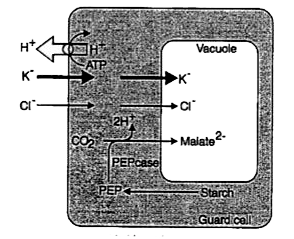What importance of potassium in opening and closing of stomata?
Text Solution
According to Malate theory given by Levitt (1974) starch is converted into malic acid in day time in guard cells. It dissociates into H+ and malate ions. H+ ions pass out from guard cells into epidermal cells and to balance it K+ ions move into guard cells from epidermal cells. K+ ions combine with malate ions to form potassium malate which lowers the water potential of guard cells and water from adjoining epidermal cells diffuse into guard cells. This increases the turgidity of guard cells and stomata get opened, as guard cells expand outwardly.
In darkness potassium malate dissociates, potassium ions pass outward into epidermal cells from guard cells and H+ ions move into guard cells which react with malate to form malic acid, The malic acid is reconverted into starch which is insoluble in water and thus water potential of guard cells increases and water diffuses into epidermal cells. This brings flaccidity to guard cells and stomata are closed.
Thus, potassium is very important for opening and closing of stomata. The accumulation of large amount of potassium (K+)in guard cells is electrically balanced by taking of chloride ions which are -vely charged.

Role of potassium, chloride and malate ions in stomatal opening. The ions accumulate in the vacuole of guard cells, lowering the water potential and thereby increasing water uptake and subsequently opening the stomata. (PEPcase = Phosphoenol pyruvate carboxylase)
|
Updated on:21/07/2023
Similar Questions
What is the importance of potassium in the opening and closing of stomata?
View SolutionOpening and closing of stomata is due to
View SolutionOpening and closing of stomata is due to
View SolutionOpening and closing of stomata is due to
View SolutionOpening and closing of stomata is due to
View SolutionHow do potassium ions help in opening and closing of stomata?
View SolutionOpening and closing of stomata is due to the
View SolutionThe element which plays an important role in opening and closing of stomata is
View SolutionThe element which plays an important role in opening and closing of stomata is
View SolutionDiscuss the active potassium theory for opening and closing of stomata.
View Solution

